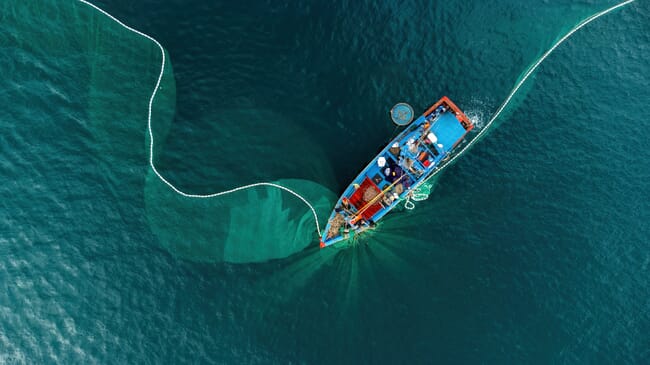
Backed by investors including Nomura Asset Management and DNB Asset Management, the investor engagement seeks to address material business risks posed by insufficient supply chain transparency at seven of the world’s largest publicly listed seafood companies: Charoen Pokphand Foods, Marubeni Corporation, Maruha Nichiro Corporation, Mitsubishi Corporation, Nissui Corporation, Nomad Foods and Thai Union. These companies supply a significant proportion of the world’s seafood, selling to leading brands and retailers around the world.
The engagement is led by FAIRR, a network backed by investors representing $75 trillion of assets under management, and is supported by World Wildlife Fund-US (WWF-US), UNEP FI’s Sustainable Blue Economy Finance Initiative, the World Benchmarking Alliance (WBA), and Planet Tracker.
A report revealing findings from the first year of this ongoing engagement shows that despite all seven companies acknowledging the growing regulatory, reputational and operational risks linked to a lack of supply chain transparency, none have published plans to implement full-chain, digital and interoperable traceability systems, exposing their shareholders to these risks.
A significant shortfall
To date, just two of the seven companies – Charoen Pokphand Foods and Thai Union – have established relatively strong, group-wide traceability commitments covering all seafood products for human consumption, and feed for farmed fish. The other five companies either do not yet have a traceability commitment or only partial traceability commitments covering certain operations and/or species. These results form the baseline against which the annual progress of this investor engagement will be measured in coming years.
Despite growth in the proportion of seafood certified by sustainability standards, consumers still can’t be certain the fish they eat is sustainably sourced. Opaque supply chains obscure links between some frequently consumed seafood products and real environmental and social issues, such as human rights violations, habitat destruction, and overfishing.
Globally seafood accounts for more global trade value than beef, pork and poultry combined. But a lack of transparency and traceability helps hide illegal, unreported, and unregulated (IUU) fishing, which comprises an estimated 20 percent of global wild-caught seafood, undermines the sustainability of fish stocks, and costs the global economy between US $15 billion and $36 billion annually.
Compliance issues
Regulators are waking up to these risks – with a growing pool of laws requiring improved supply chain traceability coming into force in major seafood markets. For example, the Food Safety Modernization Act (FSMA) in the US and the Fishery Products Distribution Act in Japan highlight the need for traceable supply chains that allow companies to demonstrate the safety, sustainability, and legality of their products.
Transparency will also support future EU Corporate Sustainability Reporting Directive (CSRD) disclosures, as well as voluntary frameworks including the Taskforce for Nature-related Financial Disclosures (TNFD). Traceability has become a must-have capability for businesses sourcing from global seafood value chains.
During its first year, this engagement established a series of traceability asks that, when achieved, will enable companies and investors to monitor and manage risks while unlocking sustainable opportunities. These asks include:
- Setting time-bound commitments to implement full-chain traceability systems covering all operations;
- Demonstrating sufficient ambition in the scope, depth and breadth of their traceability systems, in line with leading practice standards such as the Global Dialogue on Seafood Traceability (GDST); and
- Disclosing how they will deliver on their commitments, including regular progress reporting.
A two-phase process
The first phase of the seafood traceability engagement revealed promising levels of corporate engagement. As the initiative moves into Phase Two in 2025 - and is reopened for additional investor signatories - FAIRR, its partners, and participating investors will continue to engage these companies, and increase their focus on providing technical support to drive measurable progress towards robust supply chain traceability.
Sofía Condés, director of investor outreach at FAIRR, said in a press release: “As regulations tighten and consumer demand for greater accountability grows, companies that fail to implement robust traceability systems expose themselves to significant risk. Without these systems, they not only face compliance failures but also jeopardise their long-term profitability. Investors recognise that traceability isn’t just a regulatory necessity – it’s a strategic imperative for safeguarding consumer trust and long-term returns.”
Dai Yamawaki, senior portfolio manager at Nomura Asset Management, said: “Investors play a key role in highlighting the need for seafood companies to have stronger traceability systems. Through our engagement dialogues, companies seem aware of the need for better traceability, but awareness alone is not sufficient: we would welcome proactive plans towards better traceability and its disclosure, including the progress."




